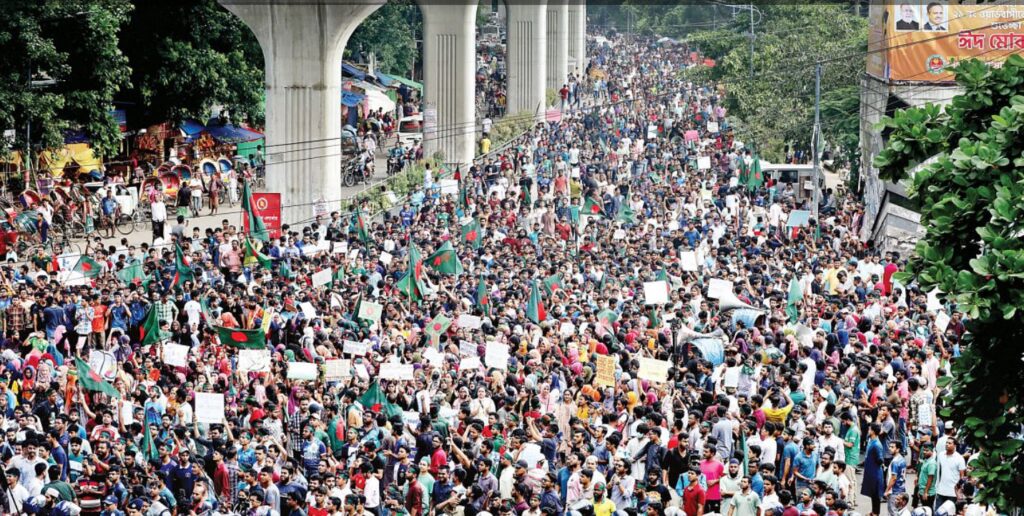
Students from different public universities and colleges on Monday blocked rail tracks, roads, and highways in Dhaka and other places across the country, demanding reform in the existing quota system for government jobs.
The blockade has thrown rail and road communications in disarray across the country, leaving the public to suffer immensely.
The protesters demanded the cancellation of a High Court order dated June 5 that asked the government to reinstate 30 per cent job quotas for the descendants of freedom fighters.
The protest that began on July 1 entered its eighth day on Monday, with agitating students blocking Dhaka’s Shahbagh crossing for more than four hours between 4:30pm and 8:40pm.
Nahid Islam, one of the leaders of the anti-quota movement, announced an all-out blockade on Wednesday if their demands were not met.
‘We will hold mass campaigns and coordinate with students of different universities and colleges in Dhaka city through online and in-person activities tomorrow [Tuesday]. Our class and exam boycotts will continue,’ Nahid said before leaving Shahbagh late in the evening.
He said that they did not lift the blockade but took a pause to prepare for an all-out blockade.
Shortly before students took to the streets in Dhaka, road transport and bridges minister Obaidul Quader, also the general secretary of the ruling Awami League, held a meeting with five cabinet colleagues on Monday over the ongoing anti-quota protests and teachers’ movement against the new pension scheme.
Speaking at a press conference before the meeting, Quader hoped that the High Court would deliver its verdict considering the reality and urged the students to wait for the verdict.
Students of Dhaka University, Jagannath University, Dhaka College, and Eden Women’s College, among others, blocked Shahbagh, Katabon, Science Laboratory, Nilkhet, Chankharpul, Hotel Intercontinental, Banglamotor, Karwan Bazar, Farmgate, and Gulistan areas from late afternoon, bringing the city traffic to a halt.
Many people were either stuck in their vehicles or forced to walk to reach their destination.
Students of Jahangirnagar University, Barishal University, Begum Rokeya University in Rangpur, the Shahjalal University of Science and Technology in Sylhet, and Khulna University blocked adjacent highways to create a huge tailback, according to New Age correspondents.
Students of Rajshahi University and Chittagong University blocked rail tracks earlier in the day, disrupting rail communication.
The protest in Dhaka began, with students gathering in front of the Dhaka University central library around 3:00pm before marching towards Shahbagh.
Students carried national flags, banners, and different placards that read ‘quota or merit’, ‘need logical reforms of quota›, and ‘no place of quota discrimination in golden Bengal.’
A significant number of protesters included female students who joined the protests with placards that read ‘quota is ridiculous when women are advanced’ or ‘I am a woman, I am not afraid of anything, I will conquer the world without quota.’
Nazmul Hasan, a Dhaka College mathematics student, told New Age at the Science Laboratory crossing that they blocked the area looking to end discrimination in the name of the quota system.
‘We will not leave the streets until our demand is met,’ he added.
Jahangirnagar University students blocked the Dhaka-Aricha highway on Monday between 3:00pm and 4:00pm.
New Age Staff Correspondent in Rajshahi reported that rail communication between Rajshahi and the rest of the country remained suspended for hours as a group of Rajshahi University students blocked the rail tracks near the campus between 11:30am and 4:00pm.
New Age correspondent in Mymensingh reported that the students of Bangladesh Agricultural University blocked the Dhaka-Mymensingh railroad for the third day between 1:30pm and 4:00pm.
New Age Staff Correspondent Chattogram reported that the students of Chittagong University blocked the rail track at Sholshahar station around 3:45pm, halting the journey of Dhaka-bound Cox’s Bazar Express for about half an hour.
Bangladesh Railway’s acting Dhaka transportation officer, Shajedul Islam, said that train communications were not normal until 7:30pm.
Talat Mahmud Rafi, an organiser of the protest in Chattogram, said that an activist of the ruling party›s student wing Bangladesh Chhatra League called his father on Sunday to issue a threat.
‘My father was told if I don’t stop my activities, he will see my body,’ Rafi told New Age.
On October 4, 2018, the government issued a circular abolishing all 56 per cent quotas – 30 per cent for freedom fighters’ descendants, 10 per cent for women, 10 per cent for people from underdeveloped districts, 5 per cent for ethnic communities; and one per cent for physically challenged people – in the civil service following student protests.
The Appellate Division on Thursday refused to stay the High Court verdict that had asked the government on June 5 to restore freedom fighters’ quota in the civil service, intensifying fresh anti-quota protests by students.
New Age

